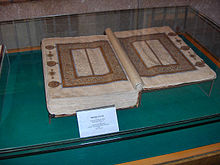An Ottoman era manuscript depicting Rumi and Shams-e Tabrizi.
Image of Rumi on an old book in the Mevlâna museum; Konya, Turkey
Rumi’s poetry is often divided into various categories: the quatrains (rubayāt) and odes (ghazal) of the Divan, the six books of the Masnavi. The prose works are divided into The Discourses, The Letters, and the Seven Sermons.
Poetic works
 Maṭnawīye Ma’nawī
Maṭnawīye Ma’nawīMevlana Museum, Konya, Turkey
- Rumi’s major work is the Maṭnawīye Ma’nawī (Spiritual Couplets; مثنوی معنوی), a six-volume poem regarded by some Sufis[37] as the Persian-language Qur’an. It is considered by many to be one of the greatest works of mystical poetry.[38] It contains approximately 27000 lines of Persian poetry.[39]
Further information: Masnavi
- Rumi’s other major work is the Dīwān-e Kabīr (Great Work) or Diwan-e Shams-e Tabrizi|Dīwān-e Shams-e Tabrīzī (The Works of Shams ofTabriz; دیوان شمس تبریزی named in honor of Rumi’s master Shams. Besides approximately 35000 Persian couplets and 2000 Persian quatrains,[40] the Divan contains 90 Ghazals and 19 quatrains in Arabic,[41] a couple of dozen or so couplets in Turkish (mainly macaronic poems of mixed Persian and Turkish)[42][43] and 14 couplets in Greek(all of them in three macaronic poems of Greek-Persian).[44][45]
Further information: Diwan-e Shams-e Tabrizi
Prose works
- Fihi Ma Fihi (In It What’s in It, Persian: فیه ما فیه) provides a record of seventy-one talks and lectures given by Rumi on various occasions to his disciples. It was compiled from the notes of his various disciples, so Rumi did not author the work directly.[46] An English translation from the Persian was first published by A.J. Arberry as Discourses of Rumi(New York: Samuel Weiser, 1972), and a translation of the second book by Wheeler Thackston, Sign of the Unseen(Putney, VT: Threshold Books, 1994).
- Majāles-e Sab’a (Seven Sessions, Persian: مجالس سبعه) contains seven Persian sermons (as the name implies) or lectures given in seven different assemblies. The sermons themselves give a commentary on the deeper meaning of Qur’an and Hadeeth. The sermons also include quotations from poems of Sana’i, ‘Attar, and other poets, including Rumi himself. As Aflakī relates, after Shams-e Tabrīzī, Rumi gave sermons at the request of notables, especially Salāh al-Dīn Zarkūb.[47]
- Makatib (The Letters, Persian: مکاتیب) is the book containing Rumi’s letters in Persian to his disciples, family members, and men of state and of influence. The letters testify that Rumi kept very busy helping family members and administering a community of disciples that had grown up around them.
Source: Wikipedia
Popularity: 6% [?]

